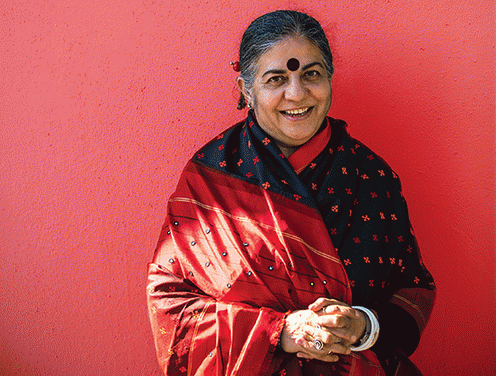Reprinted from yesmagazine.org
Trained in physics and philosophy, Vandana Shiva is renowned for her activism against GMOs, globalization, and patents on seeds and traditional foods. She co-founded Navdanya, which promotes seed saving and organic farming and has more than 70,000 farmer-members.
Sarah van Gelder: The seed has been a major part of your work.
Could you
say a little about what a seed is at its essence?
Vandana Shiva: The seed in its essence is all of the past
evolution of the Earth,
the evolution of human history, and the potential for future
evolution. The
seed is the embodiment of culture because culture shaped the seed
with careful selection--women picked the best, diversified. So from
one grass you get 200,000 rices.
That is a convergence of human intelligence and nature's intelligence. It is the ultimate expression of life, and in our language, it means "that from which life arises on its own, forever and ever and ever."
van Gelder: So what is it worth?
Shiva: It's priceless. There is no price to seed, which is why the commodification of seed is such an outrage. Every culture that I've come across believes that destroying seed is the ultimate sin. Communities have starved to death rather than eat the seed grain.
van Gelder: The prevailing worldview separates humans from the natural world, and it has had terrible effects. How are people healing this separation, and how are seeds part of that work?
Shiva: No matter what problem you look at, every ecological problem comes from this illusion that we are separate from nature.
I believe overcoming the separation is a longing much deeper than the recent rise of ecological awareness. The healing is coming from reclaiming our oneness with the web of life, with the universe itself.
Some people do it through meditation and yoga, but a lot more are doing it by just planting a seed and growing a garden. In planting a seed you are one with the cycles and regenerative capacity of life. We hear the same thing again and again from children we work with sowing gardens of hope with seeds of freedom. When you ask, "So what did you learn?" they always talk about the miracle of life--that a tiny seed bursts into a plant and gives an abundance, and they can harvest a seed from it.
A seed sown in the soil makes us one with the Earth. It makes us realize that we are the Earth. That this body of ours is the panchabhuta--the five elements that make the universe and make our bodies. The simple act of sowing a seed, saving a seed, planting a seed, harvesting a crop for a seed is bringing back this memory--this timeless memory of our oneness with the Earth and the creative universe.
There's nothing that gives me deeper joy than the work of protecting the diversity and the freedom of the seed. Every expression of diversity is an expression of freedom, and every expression of monoculture is an expression of coercion.
van Gelder: Can you say more about that? What is the relationship of freedom to biodiversity?
(Note: You can view every article as one long page if you sign up as an Advocate Member, or higher).





